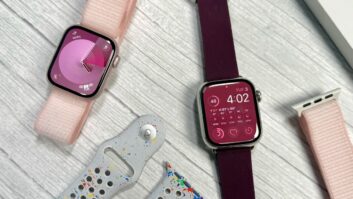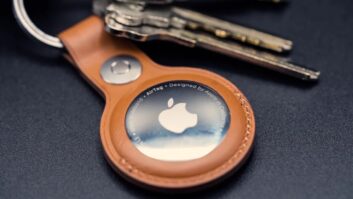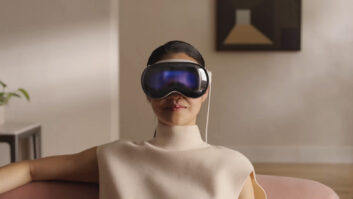No matter how you slice it, Apple is a major player in the consumer electronics industry. Its influence is far larger than its sales volume in a single product category, even if it won’t be attending International CES this week.
Since the 2003 holiday season, Apple has sold in excess of 21 million iPods of various types, with 6.4 million of those sales having taken place during the company’s third quarter, which ended Sept. 25, 2005. In addition, Apple has sold several hundred million music downloads during the same period from its iTunes music library.
This level of success is enabling Apple to do what it does best — march to the beat of its own drummer. However, it would be a mistake to interpret Apple’s absence from CES as something negative. Every major CE and PC supplier exhibiting at CES has had to figure out a response to the iPod, while hundreds of others have simply jumped onto the iPod bandwagon and rolled out a mountain of accessories for the portable music players.
“Apple is dominating the MP3 arena by design and product and many companies are trying to emulate them,” said Ahron Schachter, VP/general manager of New York-based RCS Computer Experience.
This imitation is only partially successful, Schachter said, because other portable audio vendors simply do not pull along the rest of the industry like Apple.
“The minute Apple has a new iPod, there are eight companies that come out with accessories. This does not happen with other companies — they wait to see if the product sells first,” he said.
Office Depot, which does not sell iPods, does offer a solid assortment of iPod accessories.
“Apple is definitely a dominant brand in the MP3 category. I’m not certain, however, if that dominance has extended into the overall CE business. Apple makes terrific innovative products, which are usually met with great success, but we have not seen them explode into the overall CE business as of yet,” said Janine Mitchell, Office Depot’s divisional merchandise manager for technology.
Office Depot does sell other MP3 player brands. Mitchell said the spillover from the iPod’s success can be seen in Office Depot’s healthy sales of MP3 players with feature sets similar to the iPod.
However, while Apple’s influence is tremendous, it does not place it among the top flight CE companies, at least according to some analysts TWICE spoke with.
To some, Apple’s perceived impact on the CE industry far outweighs what it has actually accomplished. Apple’s iPod sales numbers can be blamed for giving some people the idea that the company dominates the CE category, but that is far from the truth.
“To the guy on the street, Apple is still not a dominant CE brand. You must keep things in perspective. Apple has been successful with the iPod, but that is not as mainstream a device as TVs or DVD players,” said Steven Baker, The NPD Group’s research director, adding that the iPod brand may now transcend Apple’s computer product line, but comes nowhere near overshadowing a Sony or Samsung.
And though nothing has come of the rumors that Apple might plunge into the wider CE world with flat-panel TVs or a media server type device, there is no reason to believe it is totally ignoring those areas. More insight into its plans may come at its MacWorld conference to be held in San Francisco Jan. 9-13. (Apple did not respond to numerous requests to contribute to this article.)
Toni DuBois, an analyst with Current Analysis, pointed out that Apple has made some inroads into developing a media-type device with the implementation of its Front Row software that is now bundled on some Mac computers. Like Windows Media Center (MCE), Front Row allow consumers to manage all their digital entertainment content from a computer. It even comes with an iPod-like remote control to give users the ability to operate in a 10-foot viewing environment.
“It has been a small commitment at this point, but MCE’s success has not gone unnoticed by Apple,” Dubois said.
The potential is very strong for Apple — with its demonstrated ability to dominate a CE category — or any other IT company like Dell or Hewlett-Packard that have taken big chances in select CE categories, to further penetrate what are now solid CE categories. This is primarily because IT companies are much better at integrating their technology into CE products than CE companies are at incorporating computer technology into their own products.
“The CE guys still can’t figure out how to integrate IT. They really can’t think outside the box, and this is really their big weakness and Apple exploited this weakness,” Baker said.
Schachter supported this, adding that even Sony, which formerly was very pro-active in portable music, has stopped to watch what Apple is doing with color and price. Schacter said Sony should actmore like those developing its BRAVIA TV line, which has been very aggressive in setting a standard for others to follow.
The biggest hurdle facing the major CE players is breaking the hold of their corporate culture. Since most computer companies were arranged differently from the outset, it is easier for them to change than for the consumer electronic players.
Dell and HP have already done quite a bit in flat-panel televisions, and Dell has its DJ portable music player. Baker praised Apple’s decision to refrain from directly taking on the larger CE world
“It is smart of them to stay on the side. Dell and HP are taking advantage of their volume and distribution networks [for their CE lines], but Apple doesn’t have the infrastructure,” he said.
Not every computer company has made the switch as cleanly as Apple. Gateway made a huge investment into CE two years ago before quickly pulling out of the category amid a total reorganization of the company. Since then, it has slowly started poking around the edges of CE again with a large line of Media Center computers.













